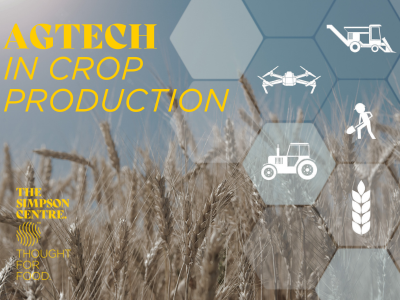Biden to Improve Agri-food Markets for Canadian Farmers
A new study argues that under the Biden administration, a stronger relationship between Canada and the U.S. will be restored, with the administration also working to rebuild important international institutions such as the World Trade Organization (WTO), and by doing so will reduce trade uncertainties, and increase agri-food trade between Canada and the U.S.
Canada and the United States enjoy the largest bilateral trading relationship in the world. Canada is the biggest destination for United States agricultural imports, accounting for 15% of total United States agricultural exports in 2019, while the United States is the largest purchaser of Canadian agri-food products, accounting for 58% of total Canadian agri-food exports. Canada and the United States are closely linked, and Canada’s dependence on the United States as a market destination is much more significant than the United States’ dependency upon Canada.
The authors argue trade disputes are common within the agricultural sector compared to the non-agricultural sector. Non-tariff barriers (NTBs) are the major cause of trade disputes, and significant government intervention is seen in every WTO member country when agriculture issues arise. The authors note,”Josling (2009) … attributes the occurrence of trade disputes to the sensitive nature and high trade protectionism within the sector.” They conclude that “The politically sensitive nature of the agri-food sector makes agricultural trade highly dependent on diplomatic ties between countries.” And finally, “Fuchs and Klann (2013) argue that risk-averse importers reward political friends and punish enemies to minimize the commercial risk associated with possible trade disruptions.” Given the substantial size and well-integrated nature of the Canada-United States agri-food sector, the authors state, “any political tension that leads to market access uncertainty could break down the agri-food marketing and value chains established across both countries.”
With this backdrop in mind, the authors first analyze the period of the Trump presidency and the Canada-United States agri-food relationship. With Trump’s open criticisms of Prime Minister Trudeau, the hostile political relationship is described as one that could create an environment of uncertainty. Numerous trade disputes were seen through Trump’s presidency, including WTO and NAFTA-related issues. During this period, unilateral imposition of aluminum and steel tariffs were imposed in order to exert pressure on Canada as a negotiating party, rather than relying on negotiation and dispute resolution to resolve trade differences. In the past, the United States and Canada have relied on the dispute resolution system of the WTO to settle many trade disputes. However, the Trump administration first criticized the WTO and then attempted to undermine the rule-based global system of trade: the Trump administration effectively shut down the WTO dispute settlement system by refusing to appoint judges to the Appellate Body of the WTO.
During the Trump administration years, the share of Canadian agri-food imported from the United States started at 53% in 2016 and grew to 55% in 2019, while in absolutes it continued to grow slightly as well. During the same period, the United States share of Canadian agri-food exports fell from 60% in 2016 to 57% in 2019. Canada enhanced its market diversification through its membership in two new major Free Trade Agreements (FTAs), the Comprehensive Economic and Trade Agreement with the European Union (CETA), and the Comprehensive and Progressive Trans-Pacific Partnership (CPTPP) with Pacific Rim countries. From 2016 to 2019, the net trade deficit in agri-foods for the United States increased from -$2.4 billion Cdn to -$4.9 billion Cdn. Canada was somewhat successful at diversification of its trade partners in agri-food, but Canada and the United States are completely linked in this sector, and the relationship cannot be easily changed.
Let us contrast this to the predictions of the Biden administration’s impact on trade. The United States had issues with the WTO that existed prior to Trump’s years in power. In comparison to Trump, however, Biden supports a strong multilateral trading system, with more impetus on working with allies to address concerns with the WTO, from within the system rather than outside it. The approach to trade disputes will be more diplomatic and less obstructionist, and the current view on eliminating trade barriers seems more compatible with Canada’s viewpoint than that of the previous administration.
Similar to the Trump regime, Biden has indicated American products and workers will come first. Biden has indicated the United States will not enter any more international trade agreements until they have made major investments in American workers and infrastructure. Within this framework, it is expected that bilateral agri-food trade between Canada and the United States will continue to grow with a more constructive and cooperative approach to solving challenges between the two countries. While the previous administration’s approach strained the Canada-United States relationship and undermined the rules-based global trading system, it is forecast the Biden administration will be a positive change for the Canadian agri-food industry.
Reference:
Sylvanus Kwaku Afesorgbor and Eugene Beaulieu, “Role of international politics on agri-food trade: Evidence from US-Canada bilateral relations,” Canadian Journal of Agricultural Economics, 2021, 1-9. https://onlinelibrary-wiley-com.ezproxy.lib.ucalgary.ca/doi/10.1111/cjag.12267


